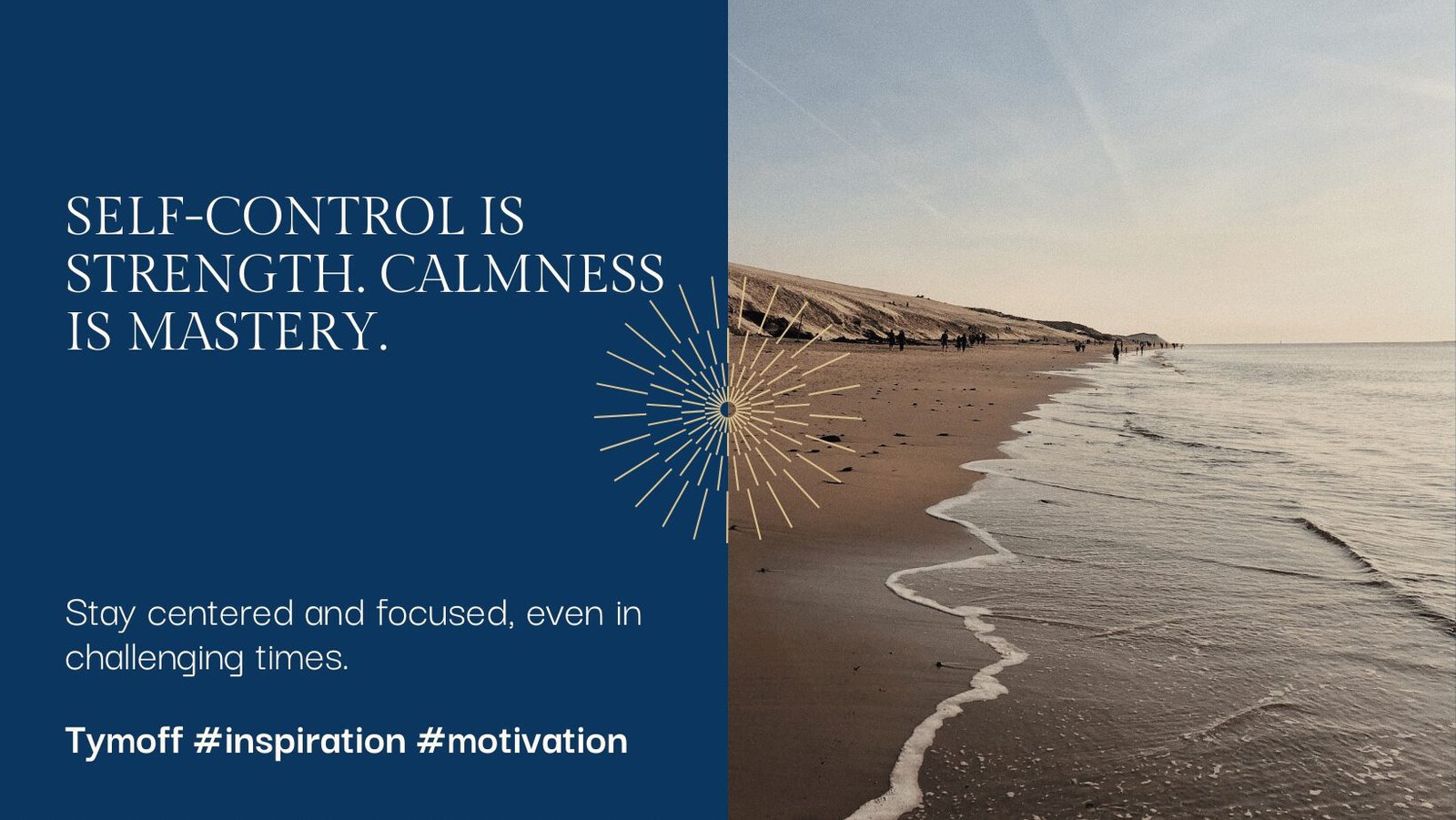In the labyrinth of human emotions and behaviors, Self-Control is Strength. Calmness is Mastery. You – Tymoff, pivotal for navigating through life’s myriad challenges. This article delves into the essence of self-control, underscoring its role as the bedrock of personal strength and the harbinger of calmness, which is the zenith of emotional mastery. Through the lens of psychological insights and practical wisdom, we explore the transformative power of self-control and calmness in shaping a life of purpose, resilience, and fulfillment.
Understanding Self-Control: The Foundation of Strength
Self-control, fundamentally, is the ability to regulate one’s emotions, thoughts, and behaviors in the face of temptations and impulses. It’s a psychological muscle that, much like the physical ones, can be strengthened with practice and determination. The significance of self-control lies in its capacity to direct our life’s narrative toward positive outcomes, enabling us to make choices that align with our long-term goals and values, rather than succumbing to the fleeting allure of instant gratification.
Research in the realm of psychology has consistently highlighted self-control as a key predictor of success in various life domains, including academic achievement, physical health, financial stability, and interpersonal relationships. The renowned Marshmallow Test, a series of studies on delayed gratification led by psychologist Walter Mischel in the late 1960s, vividly illustrates the long-term benefits of self-control. Children who demonstrated the ability to resist the temptation of an immediate reward in favor of a larger reward later on tended to have more successful outcomes in adulthood, as measured by a range of indicators such as higher SAT scores, healthier lifestyles, and greater professional attainment.
The Power of Calmness: Achieving Emotional Mastery
Calmness is the natural byproduct of self-control. It is the state of being free from agitation, stress, or excitement, reflecting a deep-seated emotional and psychological equilibrium. Calmness is not merely the absence of chaos but an active state of peace and clarity that enables individuals to approach life’s challenges with poise, perspective, and pragmatism. It is the mastery over one’s emotional responses, allowing for thoughtful decision-making, effective problem-solving, and enhanced creativity.
The importance of calmness in today’s fast-paced, often turbulent world cannot be overstated. In an era where stress and anxiety are prevalent, cultivating calmness can significantly improve one’s quality of life, mental health, and overall well-being. It serves as a buffer against the adverse effects of stress, reduces the risk of mental health disorders, and promotes a sense of inner peace and satisfaction. Moreover, calm individuals tend to be more empathetic, compassionate, and positive in their interactions with others, fostering healthier and more fulfilling relationships.
Strategies for Cultivating Self-Control and Calmness
Developing self-control is strength. calmness is mastery. you – tymoff and cultivating calmness are processes that require intentionality, effort, and time. The following strategies offer a roadmap for embarking on this transformative journey:
Mindfulness and Meditation: Mindfulness practices, including meditation, are powerful tools for enhancing self-control and fostering calmness. They involve paying attention to the present moment without judgment, which can help individuals become more aware of their impulses and emotions, and respond to them in more measured and thoughtful ways. Regular mindfulness practice has been shown to improve emotional regulation, reduce stress, and increase overall psychological well-being.
Goal Setting and Monitoring: Clearly defined goals, coupled with consistent monitoring of progress, can significantly boost self-control. This process involves setting specific, measurable, achievable, relevant, and time-bound (SMART) goals, and regularly assessing one’s behavior and choices in the context of these goals. This approach not only provides direction and motivation but also helps identify potential obstacles and adjust strategies accordingly.
Delaying Gratification: Learning to delay gratification is a core aspect of developing self-control. This can be practiced in small, everyday decisions, such as choosing a healthy meal over fast food or saving money instead of making an impulsive purchase. Over time, these choices accumulate and reinforce the habit of self-control, making it easier to apply in more challenging situations.
Stress Management Techniques: Effective stress management is crucial for maintaining calmness. Techniques such as deep breathing, progressive muscle relaxation, and engaging in physical activity can help mitigate the physical and psychological effects of stress, facilitating a calmer state of mind.
Cultivating Positive Relationships: The people we surround ourselves with can have a profound impact on our ability to remain calm and exercise self-control. Seeking out and nurturing positive relationships with individuals who embody these qualities can provide support, inspiration, and accountability.
The Ripple Effects of Self-Control and Calmness
The benefits of self-control extend far beyond the individual, influencing society at large. Individuals who embody these traits contribute to a more compassionate, understanding, and peaceful world. They are better equipped to handle conflicts constructively, lead by example, and inspire others to pursue personal growth and emotional well-being. Moreover, the capacity for self-control and calmness can be particularly influential in leadership roles, where decisions not only affect the individual but also the lives of many others.
Conclusion
Self-control is indeed strength, and calmness is truly mastery. These qualities are essential for personal and professional success, as well as for leading a fulfilling life. While the journey toward cultivating self-control and calmness may be challenging, it is undeniably rewarding. By embracing the strategies outlined above and committing to continuous self-improvement, individuals can unlock their full potential and navigate the complexities of life with grace, resilience, and purpose. In the words of Tymoff, self-control and calmness are not just desirable attributes but fundamental to the very essence of being.

